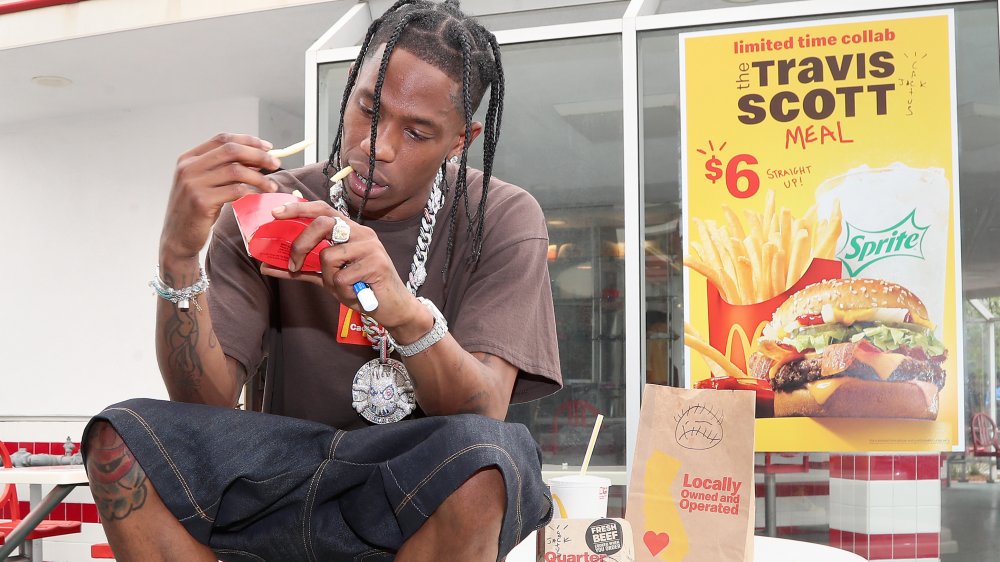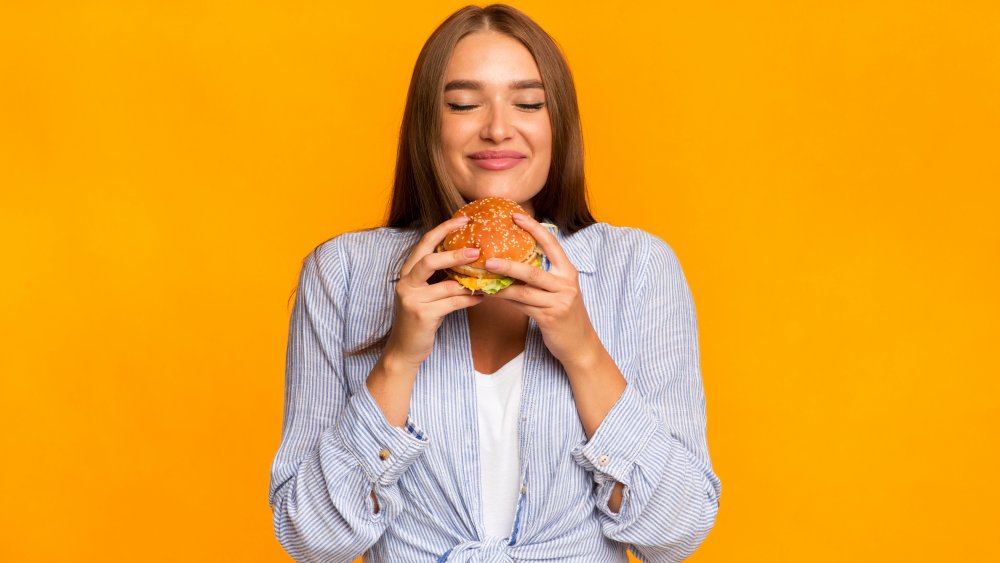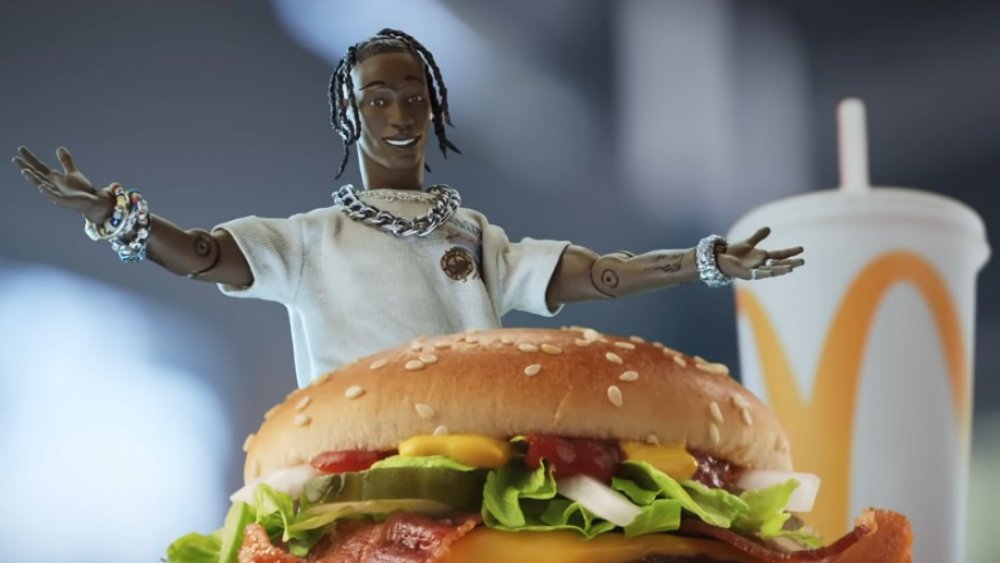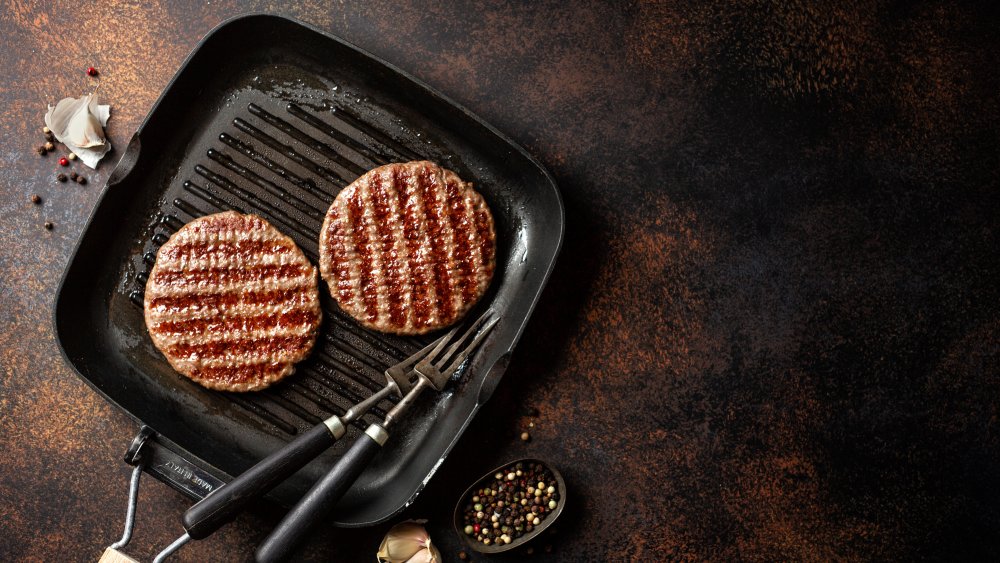What Makes The McDonald's Travis Scott Meal So Concerning
A few weeks ago McDonald's came out with a special, limited edition combo meal they called the Cactus Jack. The meal was an instant best-seller, but one not without its share of controversy. Apart from disappointed wrestling fans who expected something Mick Foley-themed and found to their chagrin that the Cactus Jack name had been repurposed by rapper Travis Scott, Restaurant Business reported that many McDonald's franchisees were less than thrilled about marketing something bearing the name of a guy who raps about such explicit content.
Scott, who is known not only for his career but also for being tied to some famous ladies (Scott is the father of Kylie Jenner's baby and was briefly in a relationship with Rihanna), may not be the most family-friendly musician around, but he's sure selling a lot of burgers. The Cactus Jack meal, which consists of a Quarter Pounder with cheese, bacon, and lettuce, a Sprite, and fries with BBQ sauce (supposedly Scott's go-to McD's order), is selling for $6, and CNBC reports that it has been so popular it's been causing ingredient shortages nationwide.
Unfortunately, there is one additional cause for concern that affects all of us, whether or not we're hip-hop (or WWE) fans or Mickey D's employees. According to nutrition counselor Joan Ifland, Ph.D., founder of Food Addiction Reset, this meal promotes the very issues her organization is battling against.
What, exactly, is food addiction?
Ifland explains that food addiction tends to "cop[y] alcoholism in terms of loss of control over behaviors." She explains that it, like any other addiction, has certain characteristics, including unintended use (mindless eating), failure to cut back, the addiction taking up a lot of time, cravings for the addictive substance, relationship problems caused by the addiction, hazardous use (she gives as an example driving while eating), continuing the addictive behavior in spite of knowing its consequences, and need for more and more of the addictive substance over time. As she says, "people are experiencing these signs in their consumption of processed foods."
As to what causes food addiction, Ifland says that all addictions are due to the brain's reward centers being hyperactivated. This causes them to be constantly "calling for the addictive substances," which in turn, "drowns out the demands of other neurons to do other things." As to why processed foods, in particular, trigger food cravings, she says that this is because they contain an overabundance of "addictive substances added to foods includ[ing] sugar, sweeteners, flour, gluten, salt, processed fat, dairy, caffeine, and some food additives."
How does McDonald's use food addiction to market the Cactus Jack meal?
Ifland sees McDonald's use of a popular celebrity spokesperson as "reinforc[ing] addicted neurons" by making use of a personality "that consumers already know, like, and trust," which, in turn, "transfer[s] the 'know, like, trust' factor to the product by association." She cites numerous studies showing that celebrity endorsers are particularly important when it comes to marketing to children, as children who associated a known character or celebrity with a product were known to have a higher opinion and, in some cases, consume greater amounts of that product than children who had not been exposed to such advertising.
McDonald's also lucked out with (or made sure of) the fact that Scott's alleged standing order at the restaurant includes the addition of bacon to their Quarter Pounder, something Ifland decries as "increas[ing] the salt, sugar, and fat content of the meal." She's also not a fan of Scott's choice of condiment, saying that "although it's hard to imagine, the BBQ sauce for the fries might even be sweeter and saltier than ketchup," having previously mentioned both salt and sugar as highly addictive substances.
What can we do to avoid the addiction trap?
Perhaps not too shocking is Ifland's advice regarding how you can avoid getting sucked into a food addiction: "Avoid fast food like the plague." She also says that you should try to avoid fast food advertising at all costs (DVR to the rescue!) so as to "protect your brain from manipulation by addiction marketeers!"
Ifland trots out the tried-and-true advice that what you should really be doing is making food at home, since, as she points, out, "the irony is that homemade food is much faster than fast food." It's true, as she asserts, that frying up ground beef in a skillet takes less time than waiting for your fast food order, particularly when you factor in the drive to the restaurant and back home again (unless you're eating the meal in your car, which, see "hazardous use" above). She advises cooking large amounts at one time, so you'll have lots of leftovers for future meals. Sure, they may not be too fresh, but then again, neither is Mickey D's on a bad day. Plus, mediocre home cooking leads to uninspiring leftovers, which are likely not too addictive, so even if you're not that great of a cook, perhaps it's all for the best.



